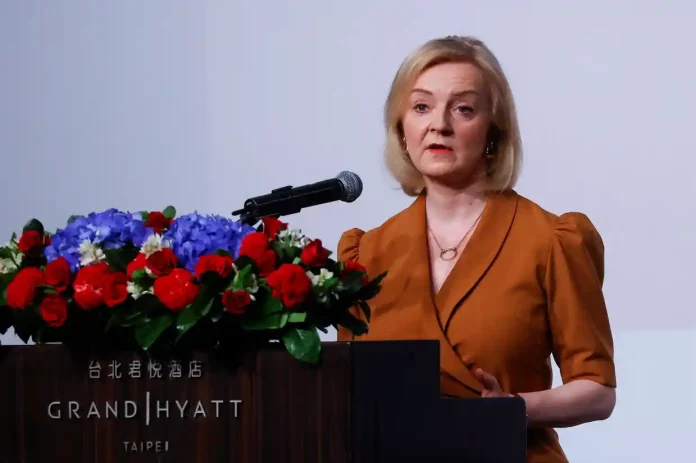In a significant keynote speech delivered in Taipei, Liz Truss emphasized the imperative for free nations to demonstrate unwavering support for Taiwan. She underscored the need for tangible measures to safeguard Taiwan’s freedom and resilience in the face of China’s escalating authoritarianism.
Truss, a former British prime minister who held office for 49 days in 2022 following her tenure as foreign secretary, arrived in Taiwan on Monday for a five-day visit, during which she is scheduled to engage with high-ranking government officials.
Truss’s visit carries immense significance, as she is the highest-ranking British politician to undertake such a trip since Margaret Thatcher. Her stance drew reproach from China’s UK embassy, which condemned the visit as a perilous political spectacle that would only harm the UK. However, Truss remained resolute in her mission to demonstrate solidarity with Taiwan, a nation that she views as being at the forefront of the global struggle for freedom.
Liz Truss Advocates for Strong Defense Cooperation and an “Economic NATO” to Counter Beijing’s Ambitions
Amidst Beijing’s persistent claim that Taiwan is a part of China, with Chinese President Xi Jinping not ruling out the use of force for what he terms “reunification,” the resolute rejection of Chinese rule by Taiwan’s government and its people has raised concerns worldwide about the potential conflicts and their repercussions.
During a speech and panel discussion at the Prospect Foundation, a Taiwan-based think tank, Liz Truss emphasized the need for concrete defense capabilities to establish meaningful deterrence. She argued that relying solely on international bodies like the UN Security Council or the World Trade Organization was insufficient, and called for the formation of a “network of liberty.” Truss proposed that free nations join forces to establish an “economic NATO” to effectively coordinate resistance against Beijing’s actions.
Addressing the upcoming G7 meeting in Hiroshima, Truss urged the member nations to align their economic strategies to counter Chinese economic coercion, highlighting the need to confront what she referred to as “bullying on a major scale” occurring on the international stage.
Truss also highlighted China’s strategic use of Taiwan’s international participation and called for the swift approval and fast-tracked membership of Taiwan in the Comprehensive and Progressive Agreement for Trans-Pacific Partnership, while suggesting that China’s membership be denied.
Liz Truss, a hawkish member of the British Conservative Party, delivered a speech that appeared to challenge the statements made by current government officials and their European counterparts. In contrast to UK Foreign Secretary James Cleverly’s emphasis on engaging with China on climate change, Truss expressed concern over the conflicting messages coming from the free world. She dismissed the notion that the West could still cooperate with China on certain issues as a “false idea.”
Truss called upon Prime Minister Rishi Sunak to fulfill his earlier statement regarding China being the “biggest long-term threat to Britain.” She advocated for the closure of Confucius Institutes in the UK and the exclusion of any resumption of economic dialogue with Beijing, emphasizing the need to avoid further integration with the Chinese economy.
Truss also criticized recent remarks made by French President Emmanuel Macron, asserting that it was “completely irresponsible” for European nations to neglect Taiwan due to its geographical distance or perceived lack of relevance to their core concerns.
During her speech, Truss condemned the rule of the Chinese Communist Party, highlighting issues such as the Tiananmen massacre, human rights abuses in Xinjiang, and the crackdown in Hong Kong.
As is often the case with foreign dignitaries visiting Taiwan, Truss faced rebuke from Beijing, which opposes any action that recognizes Taiwan’s sovereignty. Her visit is part of a longstanding trend of international figures drawing criticism from China for their engagements with Taiwan.
Beijing’s Increased Military Harassment of Taiwan Following Nancy Pelosi’s Visit
Following a visit to Taiwan by then-US Speaker Nancy Pelosi in August, Beijing significantly escalated its military harassment of the island, establishing what the head of the Prospect Foundation referred to as a “new normal” prior to Liz Truss’s speech.
When asked about the potential impact of her visit on Taiwan’s security situation, Truss stated that she had been invited by the Taiwanese government, which is best equipped to assess what actions would be beneficial. She emphasized the need to confront and stand up against Beijing’s attempts to limit visits, silence Taiwan’s supporters, and intimidate individuals on an international scale.
The Chinese tabloid Global Times published an editorial on Tuesday evening echoing criticism voiced by Alicia Kearns, the chair of the UK Foreign Affairs Select Committee, who referred to Truss’s visit as “the worst example of Instagram diplomacy.” The Global Times dismissed such visits as unappealing performances that were losing their relevance and attracting fewer audiences.



